Coming November 16, another new movie based on the oldest story in English: Beowulf.
The tagline on the in-theatre poster: Pride is the curse.
Trailer 1:
Trailer 2 [Note: nudity and violence]:
-srbp-
The real political division in society is between authoritarians and libertarians.
Coming November 16, another new movie based on the oldest story in English: Beowulf.
The tagline on the in-theatre poster: Pride is the curse.
Trailer 1:
Trailer 2 [Note: nudity and violence]:
-srbp-
Broadcast journalists will inform the public in an accurate, comprehensive and fair manner about events and issues of importance.VOCM is also a member of the Canadian Broadcast Standards Council. The Council’s Code of Ethics states:
It is recognized that the full, fair and proper presentation of news, opinion, comment and editorial is the prime and fundamental responsibility of each broadcaster. This principle shall apply to all radio and television programming, whether it relates to news, public affairs, magazine, talk, call-in, interview or other broadcasting formats in which news, opinion, comment or editorial may be expressed by broadcaster employees, their invited guests or callers.Randy Simms is a VOCM on-air personality. On election night, he provided colour commentary on the results for CBC TV. During the course of the night he made assertions of fact which elicited this response on CBC’s Your View website feature:
I just cannot understand why Randy Simms is on tonight commenting on the election as he is far from an expert! For one thing, his comment that "the province's MHAs want what federal members get - they get a pot" is incorrect. If he had looked into this matter, he would have been told that federal politicians do not have a pot and are actually prohibited from giving donations, money to sports groups, charities, individuals, etc. - that's been the policy for years. When he makes remarks like these, he loses all credibility on his other comments. Otherwise, I have been enjoying your coverage. Lynn Tucker Torbay Posted October 9, 2007 10:13 PM
Lynn Tucker is right.
Randy Simms was, and is wrong.
And, in repeating the same assertion recently, on his own VOCM program, regarding federal members and their non-existent “pots”, he didn’t become any less wrong.
In fact, he became wronger, if that is even possible.
It is bad enough that certain members of the House of Assembly used the non-existent federal “pots” to justify their own spending practices.
They do not need Randy Simms, contrary to the radio industry’s own standards, to flog that falsehood for them.
-srbp-
Personality Cult, that is.
Pam Frampton, Telegram story editor.
Her column could scarcely be more wrong factually, it could have easily been written for the recent Tory campaign.
Yes, ladies and gentlemen, the news media is the New Opposition.
The Danny-approved, new style opposition.
No opposition at all.
Just breathless support.
-srbp-
So Walter Noel wants the Liberal nomination in St. John's east for the upcoming federal election.
And he's indignant at the Auditor General's recent report on inappropriate spending by members of the House of Assembly.
better to suck it up, Walter, and stop whining about reporters showing up at your house.
Settle the whole matter toute de suite and without hiring an expensive solicitor.
If one of the self-described moving forces behind the Vic Young mythology committee wants to re-enter elected politics, he's only got to pass a simple test:
Reveal the names of all the people who received gifts - both in cash through donations and in the various items described by Noel and the AG - which Noel claimed from his public expense accounts both as a minister and as a member of the legislature.
Tell the voters what he bought, where he bought it, who he gave it to and how much it cost.
Noel's original story was that he had handed out gloves and scarves. Now it's supposedly women's golf shirts and jackets. See, if there had only been a couple of gifts, it's hard to imagine how gloves and scarves could be confused with golf shirts. Since Noel served as a cabinet minister for much of his time in the legislature he had access to two expense accounts. Maybe he was getting the two confused when he made his original comment, but since he was able to tell CBC radio on Friday what the invoices said that accompanied his expense claims, that tell us that Noel has a set of copies. So let's see the whole schmeer, Walter.
Send the information to bondpapers at hotmail dot com, Walter, and we'll be happy to tell taxpayers how you spent their money.
Better still, make photocopies of the receipts and claims available and Bond Papers will gladly post scans of them.
Under the circumstances, when you've already spent public money, Walter, and want another shot at spending it, you have an obligation to disclose exactly how you spent the money of a half million other taxpayers the last time you sat in a legislature.
-srbp-
labradore demolishes with facts the claims of the provincial government and some reporters as to why the House of Assembly cannot hold a fall session this year.
-srbp-
 And a campaign sign.
And a campaign sign.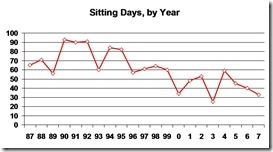 While it had plenty of time to get ready for a fall sitting, the Williams administration announced on Thursday that the House of Assembly would not be called into session until an unspecified time in early 2008.
While it had plenty of time to get ready for a fall sitting, the Williams administration announced on Thursday that the House of Assembly would not be called into session until an unspecified time in early 2008.
The table at left demonstrates that the sitting days of the provincial legislature have been declining dramatically under the current administration.
The last session of the House also demonstrated the increasing tendency for government to rush important legislation through the legislature without thorough and proper debate.
The official excuse for the missed fall sitting - repeated approvingly by CBC's provincial affairs reporter without any analysis - is that there simply isn't enough time to get everything ready.
Sheer bunk.
A properly functioning government would normally be developing legislation in anticipation of a second sitting of the legislature. During the campaign, the premier indicated that several ideas in his party's platform, including the bootie call policy, were already being considered well before the election date. On top of that, in the current context, there are several issues that could stand with public scrutiny in the one place where any government can and should be held properly accountable for its actions, namely the legislature. These issues would include the Hebron negotiations, development of the Lower Churchill, the energy plan, health care (including the Burin radiologist case) and education funding.
There is no legitimate excuse for cancellation of the fall sitting.
Of course, there have been persistent problems with the current administration functioning on a smooth, orderly and timely basis. It took four years to proclaim its own accountability legislation and then gave an additional two years for full compliance once the act was proclaimed. A story in the Thursday Telegram (not available online) reported that privacy protection sections of a piece of legislation passed five and a half years ago have still not been proclaimed. Speaking on VOCM Night Line, justice minister Tom Osborne said that some government departments are still not in a position to comply with the privacy provisions and so implementation will be delayed until such time as all departments are ready. Osborne gave no timeline for implementation yet insisted - as with all issues facing the current administration - that the privacy provisions of the bill in question remain a "priority" for government.
As an ominous portent of the future, a Liberal party spokesperson had no problem with keeping the legislature closed for an extended period, saying only that perhaps the government might consider calling the House into session a little earlier in the New Year. New Democratic Party leader Lorraine Michael expressed some consternation.
However, if the re-elected members of the opposition parties continue their past practice of co-operating fully with government's efforts to speed passage of legislation, then the legislature might well wind up sitting for only a handful of days each spring.
The situation is reminiscent of the one in the late 1980s when the Peckford administration opened the House only when necessary. It severely restricted the budget of the opposition and, by keeping the legislature closed, forced the opposition to submit costly access to information to requests in order to find information that would have otherwise been available.
Given that Premier Danny Williams has such evident lack of regard for the legislature as an institution, it wouldn't be surprising if one of his caucus repeated the immortal words of a Peckford- era cabinet minister, saying that he couldn't care less if the opposition party met in a telephone booth.
-srbp-
So what exactly did Len do during his brief vacation that coincided, oddly enough with the period of the election?
No surprise at all.
He left the job to run the Tory campaign and now takes his patronage reward back for another four years.
-srbp-
Harvey Hodder is the outgoing speaker of the House of Assembly.
His comments on the House spending scandal on Monday make plain that the people who endorsed, condoned, approved of and participated in the excesses simply do not appreciate that what they were engaged in was ethically wrong.
"Some members, myself included, paid some of my constituency expenses out of my own pocket so I would have more money to give to the school breakfast program ... I don't apologize for that," Hodder told a news conference at the legislature, saying the donations were the actions of "sensitive, outreaching, loving people."
"It is regrettable that there are hungry children in this province, in my former constituency, who could've benefited from some of that money."
As much as Hodder crowed about the new rules and the new standards, his own self-serving defence of inappropriately directing public money as cash gifts to individuals and organizations goes a long way to explain how the old system - which had rules - was systematically dismantled by the members of the legislature themselves. Far from being a star chamber, the old House management committee comprised the senior leadership of the legislature, including successive Speakers.
If there was criminal activity, they did not know of it. But they knew and condoned the excessive, and inappropriate, spending. The allowances and assistance budget of the legislature was overspent by almost $1.0 million in the first two years of Hodder's tenure as Speaker. He and his colleagues knew that. They knew of the "donations" system and, as Chief Justice Green revealed, they overwhelmingly endorsed it. Newfoundland and Labrador was the only jurisdiction in North America and certainly the only one in Canada where elected officials had access to what amounted to a slush fund to dispose of as they saw fit.
The members of the legislature directed public money to whatever group or organization or individual they alone deemed worthy. They did so out of the public eye. They gave not a moment's thought - as Hodder makes plain - that the recipients of the legislator's largesse with public money were very often groups that received funding from the provincial government through established programs that were far more fairly and transparently administered than the legislature's scheme.
As the school lunch association's annual report noted in 2003-04 (the last year available on line) "[e]ach year the Government of Newfoundland and Labrador contributes $75,000 to the program." The members of the legislature had it within their considerable power to increase funding through proper channels if there actually were "hungry children." They had the ability to fund health care transportation or volunteer fire departments properly. Instead, they elected to keep a fund available to themselves to hand out personally and largely secretly. If there are indeed hungry children in Hodder's district since the donations scheme was exposed, then that is because Hodder and his colleagues failed utterly to discharge their considerable responsibilities appropriately.
Hodder's staunch defence of inappropriate actions - even as he introduced new rules designed to undo the old scheme - should give every single voter in Newfoundland and Labrador considerable concern. While Hodder will soon be gone, his colleagues from all parties who participated in and enthusiastically endorsed the donations scheme have been re-elected. Beth Marshall - the former auditor general - is even more strident than Hodder in her defence of of the inappropriate spending. There is no sign the re-elected legislators have changed their minds on what is appropriate and what is not, when it comes to spending public money any more than Harvey Hodder has.
And as the summer of pre-campaign love demonstrated, some politicians were quite willing to use public money for donations and to do so in a partisan fashion.
The roots of the House spending scandal are far deeper than most have been prepared to acknowledge. The roots - the very deep roots - obviously remain. Perhaps the new rules will starve them. The people of the province can only hope the roots will rot.
Voters in the province would be justified in keeping a very close eye to make sure that, rather than starve the weeds, the politicians might find a way to nurture them to bloom in a new pot of public money. Politicians who can see nothing in wrong in what they did, re-elected with what they may take an as overwhelming public endorsement of their actions, might find a way to bring back the old scheme in a new place.
As Harvey Hodder demonstrates - indeed as virtually all the old hands have demonstrated - self-serving rationalizations are never far from their lips.
-srbp-
The Telegram is fairly predictable, at least when it comes to chastising other newspapers in the country for editorials that attack the premier of the moment. Undoubtedly one could hunt through the archives and find telly-torials defending Brian Tobin, Brian Peckford or Joe Smallwood with the same vigor used lately to uphold the national honour of Danny Williams.
In the past couple of weeks, the Telly has taken to task both the Globe and Mail and, in today's edition, the National Post. The mainland papers are criticized for being out of touch or, in the case of the Post, for what the Telly termed "straightforward character assassination."
The Telegram editorials are also fairly predictable - at least on these issues - when it comes to getting it wrong for the most part; take for example one point the Telly makes, namely the Danny Williams ads last year didn't say "Vote ABC". This is so small a point as to be insignificant, given that the ads came in the context of Williams' campaign to encourage Canadians to vote for anyone but Conservatives.
On the only substantive error of fact in the Post editorial, the Telegram is correct. The Post claimed the Nova Scotia deal on Equalization is better than the current Newfoundland and Labrador situation. It isn't.
The Post editorial makes its core point in the last sentence of the first paragraph: "While his [Williams'] militant schtick has proven wildly popular in Newfoundland --he won re-election on Tuesday with nearly 70% of the total vote -- it will prove toxic to his province in the long run."
There's absolutely nothing new in this at all. Many people in Newfoundland and Labrador and elsewhere have made the point that ceaselessly attacking the foreign demonios or blaming outsiders for everything is an approach that will ultimately work against both the Premier and the province.
The Post also makes a fairly obvious point, obvious that is to anyone who takes a few minutes to consider what is at the root of the whole Equalization racket between Williams and Stephen Harper, for example.
Williams came to office claiming and he continues to claim that his goal is to make the province economically self-reliant. In the recent provincial election, Williams and his team members proudly declared that the province will become a "have" one within two years.
At the same time, Williams major achievement from his first administration was to secure - wait for it - an additional $2.0 billion in federal transfer payments. His feud with Harper is about - wait for it - continuing federal transfer payments to the provincial government, potentially as he originally sought in 2004 after the province no longer qualifies for Equalization. In other words, after the province becomes "have", which by definition means no longer qualifying for Equalization, Williams has been looking for ways to keep the federal hand-outs flowing. So obvious is this logical contradiction in Williams' argument that Bond Papers noted it in 2005 in a post titled "The Independence of Dependence."
Ultimately, the shortcoming of both editorials is that they focus on the personality involved rather than on the substance of the policies involved. This is almost inevitable given that Williams has become the personification of politics in the province. And if the Telly editorialists missed this other really obvious point, Williams views himself as the embodiment of the province and its people. As he told Rex Murphy, Williams believes that his party is so popular because he represents in his heart and soul, "the hearts and souls of Newfoundlanders and Labradorians."
The cult of personality has already seriously distorted public debate in the province on any issue of substance. Given the political hegemony resulting from the recent election, the people of the province will have to see if any genuine alternative points of view arise.
If the Telegram editorial pages are any indication, it is unlikely that local news media will be willing or able to fill a very obvious need.
-srbp-
Yeah, right.
These are just the talking points the news media have learned about. They never seem to be able to figure out how all those talk radio callers - especially the regular ones - seem to say exactly the same thing at around the same time as the political parties do.
Think back to the "bankruptcy" thing.
And oh yes.
The provincial government could never manipulate the opinion environment to influence a poll, either.
How do we know?
Just ask the company that polls every quarter for the provincial government.
-srbp-
Geoff Meeker raised a question this past week about the nature of election campaigns and media coverage. Specifically, Geoff took some exception to a comment by CBC provincial affairs reporter David Cochrane's comment that
The 21 or whatever days of the campaign is about working the phones, finding out who may vote for you, identifying them and then getting them out on voting day. It is a mechanical exercise with the air war of the leaders traveling around to give you a little bit of a bounce. But it’s an operational exercise more than a philosophical exercise.
Geoff then discussed media coverage during a campaign, arguing that news media should be adopting a somewhat critical posture during elections. As Geoff put it:
I think elections should be a time to ramp up the tough questioning of our politicians. Sure, send the reporters out on the hustings to tell us what the leaders are saying, and make hay when they screw up. That's part of the entertainment. But if that becomes the primary focus of our election coverage, something is wrong with the system.
Cochrane is right. During the 21 days or so of a campaign, the political parties ought to be focused on the essentially organizational exercise of finding the vote, fixing it in place and then firing it at the polls. Campaigning is a logistics problem in that it is basically about the marshalling of resources and managing their use. How the forces are deployed, how they are used and to what end is the strategic question but at the heart of strategy lies logistics. It is futile to develop a strategy calling for spending millions of dollars based on the deployment of hundreds and thousands of volunteers if either the cash nor the bodies exist.
This is not a deterministic argument. A comparative lack of resources does not equate to defeat, either in a specific battle or indeed even in a campaign, military or political. Misuse of resources, that is bad strategy, can and often does lead to defeat. What we saw in the recent provincial election was the result of both logistical differences among the parties as well as some pretty severe strategic errors. We also saw something that actually had nothing to do with logistics but rather another element of campaigns: will. This is where Cochrane's comment is wrong.
Politics is a clash of wills, a clash of ideas, supported by the clash of the machines. A candidate and a political party must want to win but there must be an idea that captivates the imagination or connects with the voters. Without a reason to vote, there would be only a handful of people trooping to the polling booth. Without the desire to campaign and to win, there is no hope of success for that party. There may be two competing wills engaged in the contest, and in that instance, the campaign will go to the one which better marshals and deploys its forces or which has the will to win. In western Labrador, the progressive Conservatives did not quit until the last ballot was in the last box; the new Democrats took the weekend off and effectively quit before they had finished. The stronger will won.
Similarly, as noted here, one of the most obvious things about the Liberal campaign was that the party - as a whole - had accepted defeat not at the start of the campaign but indeed weeks, months and possibly years beforehand. The outcome was only determined by the willingness of one party - in this case the Liberals - to accept the popular commentary that outcome was predetermined. Gerry Reid said as much in his concession speech. Compare that, however, to the British position in May 1940. Tossed off the continental by the Germans, her major ally defeated, and with few of its soldiers left outside German prison camps, Britain stood in a position where many countries had been before. Many countries had sued for peace. Many people expected the British to seek peace. The only thing that paved the way for the subsequent defeat of Germany at that point was the bull-headed determination of Winston Churchill not to accept the conventional wisdom.
Meeker is right here too, up to a point. Take a look at the CBC campaign blog and one finds a disturbing quantity of puffery, including the breathless references to Danny Williams being greeted like a rock star. The CBC is far from alone in this sort of superficial reporting, incidentally, but this sort of commentary - even if it didn't make it into the main stories - is surely an indication of the extent to which embedded reporters can become an integral part of the campaign which they are supposed to be covering at some distance removed:
I missed out on Fogo and Change Islands because there wasn't enough room on the chopper but my cameraman went along and shot what was some of the most interesting and confrontational tape of the week. People in both places had a long list of grievances to place at Williams's feet: the ferry service, outmigration, the hospital, and on it went.
'The hem of Williams's garment'
But Williams listened. His people took notes and promised to get back to people. But other than there and Goose Bay (disgruntlement over the Energy Plan is rife in Labrador) it was mostly about touching the hem of Williams's garment. There is no denying that the guy is popular. At times, it was like being on tour with Mick Jagger! I'm not kidding.
There is a lamentable tendency among news media to focus on the superficial aspects of politics. They will talk of polls and the horse race: who is ahead? Who is behind? is the Liberal campaign beset by a curse? Polls especially appear to the amateurs to be the essence of the campaign or indeed of politics itself. Which of the province's reporters - Cochrane included -has not spoken as if the CRA polls revealed the essence of all things political? In truth, those polls did no such thing. The Progressive Conservatives finished the current campaign with the same share of the total eligible vote as they did in 2003. The Tories won such a large number of seats this time around, not because they won the approval of the hosts forecast by CRA but because they held the singer and the Liberal vote never showed up at the polls.
CRA's poll results have indicated an apparent satisfaction level on some issues that were at odds with the overall impression. Newsrooms have an option to go with something other than the same pollster used by the government - either Liberal or Conservative - and yet for some inexplicable reason most do not.
Consider for a moment that in the recent campaign, reporters actually elected to rationalize - to explain away - what Danny Williams meant by the word "race" rather than simply ask him what he meant. The comment may have been meaningless but we will never know because the reporters in the room preferred to invent a meaning rather than ask a simple question. The Telegram gave front page prominence to a leak from the highest levels of the Tory campaign aimed at one candidate and yet a week later ignored the background to or implications of Tory claims about imminent bankruptcy contained in their attack on Gerry Reid's comment in Labrador. Did anyone consider checking the actual state of the province's finances?
In the final days, newsrooms ignored entirely Williams' sneering comment aimed at Ed Joyce and yet picked up on comments by the supporter of another party. This is nothing new; similar things occurred in 1996 or 1999 with another premier of another political stripe. There may well be aspects of the Liberal or new Democrat campaign that went unreported but that is really no excuse or balance. As Meeker rightly noted, newsrooms in this past election campaign didn't deploy resources to identify and report "inaccuracy, hypocrisy, blatant stupidity or deliberate untruth", irrespective of origin.
News media in the province - in general - have tended to focus on superficial aspects of politics over the past decade, much as their colleagues elsewhere have done. If anyone doubts the absence of distance - and its relative "skepticism" - consider that a year and a half later, that when it comes to spending scandal no one can say what politicians knew what, when and what they did or didn't do about it.
In a small media marketplace, the inclination of reporters should be to distance themselves from the subjects on whom they report. That distance will become more important to the public good in the next four years than it has been for quite some time.
-srbp-
If you want to see what savvy political use of the Internet looks like, then take a look at the Australian political parties.
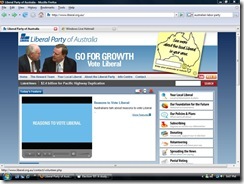 The incumbent Liberal Party site has all the right bits including multi-media presentation, ways to get involved (donate, volunteer etc), and information on the platform. The site includes RSS which allows people to get regular updates without having to visit the site: in other words it pushes information at the voter in a way that can be viewed as either a supplement to other means of communication or as a way of bypassing news media filters.
The incumbent Liberal Party site has all the right bits including multi-media presentation, ways to get involved (donate, volunteer etc), and information on the platform. The site includes RSS which allows people to get regular updates without having to visit the site: in other words it pushes information at the voter in a way that can be viewed as either a supplement to other means of communication or as a way of bypassing news media filters.
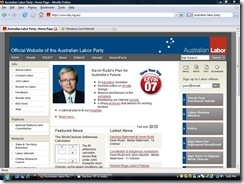 The same can be said of the Labor Party site.
The same can be said of the Labor Party site.
Compare that to the main websites in the recent provincial election Newfoundland and Labrador.
 While the Progressive Conservative site was the best of the three, it was very much the best of the old school. This is not a site designed to encourage citizen participation. It is merely a one-way message sending site and the only message really being sent is the face of the commodity being marketed.
While the Progressive Conservative site was the best of the three, it was very much the best of the old school. This is not a site designed to encourage citizen participation. It is merely a one-way message sending site and the only message really being sent is the face of the commodity being marketed.
Take a stroll through the site and look at the contradictory messaging. There's much talk of "team" but how many images show "The Leader" without a team anywhere to be seen?
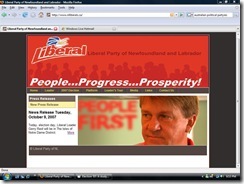 The Liberal site was built on the same basic concept of message send without any concern for feedback, interaction or even stimulation. There was nothing on either the Tory or Grit sites to do that: this is elitist, top-down politics.
The Liberal site was built on the same basic concept of message send without any concern for feedback, interaction or even stimulation. There was nothing on either the Tory or Grit sites to do that: this is elitist, top-down politics.
The site was marred by dead links (let alone irrelevant ones) and a platform document that was cumbersome to access.
Take a look at the picture on the front. No people. Just a glum-faced Gerry Reid in what unfortunately became the defining image of the Liberal Party.
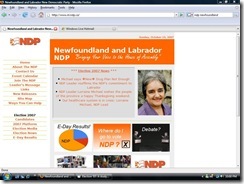 The provincial New Democrats fell very much into the same old school approach and their website is just the non-election site with some new stuff on it.
The provincial New Democrats fell very much into the same old school approach and their website is just the non-election site with some new stuff on it.
Sure the provincial NDP is a small outfit and they are still suffering the effects of the long stagnant leadership of Jack Harris, but as with the Liberals, they really don't have much of an excuse for such an unimpressive site. This Internet stuff is actually easy and relatively cheap to do. For parties with little cash to throw around, Internet campaigns can be a way of reaching audiences inexpensively but very effectively.
While there's no way of knowing for sure - unless the parties released their traffic details - consider that the Liberals and the New Democrats likely had less attention paid to their online media than I.P. Freely did. A few clicks and you can find the youtube.com homepage for the I.P. Freely videos. Take a look at the total views for each one. Even the stuff posted during the recent election had hits in the hundreds and that's on a site that wasn't being promoted as heavily as either the Liberal or New Democrat ones. For all the technical and other flaws the I.P materials show, people were interested enough to look at them.
The Internet is a communications tool waiting to be used. The examples are there. Local political parties just have to decide to use it. Rather than moan about voter 'apathy", political parties just need to find new ways to reach voters.
The federal government and the four Atlantic provinces signed a memorandum of understanding on Sunday setting up a committee to further develop the concept of an Atlantic gateway for trade and export.
Text of the MOU can be found at the gateway website.
The purpose of this MOU is to affirm the intention of the Parties (Canada, New Brunswick, Newfoundland and Labrador, Nova Scotia and Prince Edward Island) to collaborate on the development of an Atlantic Gateway strategy within 24 months from the signing of this MOU by:
• Confirming a shared vision and shared objectives;
• Outlining a governance structure for developing the Atlantic Gateway;
• Developing a joint action plan; and
• Adopting a communications protocol.
-srbp-
Sue's gone bye-bye.
Some of her other dead blogs are still around, like "Sue's News", but they haven't been updated in centuries.
Oh well.
Not like this hasn't happened before.
-srbp-
Read Mark Watton's summary of the latest Bill Rowe column rather than read it in the original.
-srbp-
 Electoral districts colour coded by percentage of popular vote for winning party.
Electoral districts colour coded by percentage of popular vote for winning party.
[h/t to labradore]
-srbp-